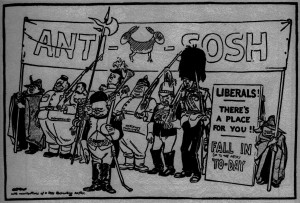Churchill on Socialism

This quotation is now going around the web, broadly attributed to Churchill. Is it accurate? “Socialism is a philosophy of failure, the creed of ignorance, and the gospel of envy, its inherent virtue is the equal sharing of misery.” —M.S. via email.
It is more or less correct, but it’s a truncated version of two separate comments, run together to make them more interesting (in the eye of the drafter).
“Socialism is the philosophy of failure, the creed of ignorance, and the gospel of envy.” —Perth, Scotland, 28 May 1948, in Churchill, Europe Unite: Speeches 1947 & 1948 (London: Cassell, 1950), 347.
“The inherent vice of capitalism is the unequal sharing of blessings. The inherent virtue of Socialism is the equal sharing of miseries.” —House of Commons, 22 October 1945
A variation on the above is: “I do not at all wonder that British youth is in revolt against the morbid doctrine that nothing matters but the equal sharing of miseries, that what used to be called the ‘submerged tenth’ can only be rescued by bringing the other nine-tenths down to their level…” —House of Commons, 13 June 1948
Churchill’s legacy includes his philippics against socialism, said the late Dr. Harry Jaffa,
which are no less trenchant than those against fascism and Communism. Consider the following excerpts from a speech in the Commons in 1949: “I was brought up to believe that taxation is a bad thing, but the consuming power of the people a good thing. I was brought up to believe that trade should be regulated mainly by the laws of supply and demand and that, apart from basic necessaries in great emergencies, the price mechanism should adjust and correct undue spending at home….I was also taught that it was one of the first duties of Government to promote that confidence on which credit and thrift….can alone stand and grow. I was taught to believe that these processes, working freely within the limits of the well-known laws for correcting monopoly….would produce a lively and continuous improvement in prosperity. I still hold to those general principles.
“Socialists [on the other hand] regard taxation as good in itself and as tending to level our society….Everything possible is done discourage and stigmatize the inventor. The Chancellor [of the Exchequer] speaks in slighting terms of profit earners….What a lot of contempt he put into it—”profit earners.” There was an old Gladstonian expression: ‘Let the money fructify in the pockets of the people.’ That is regarded as a monstrous device of a decadent capitalist system.”
This moreover puts us in mind of that dictum concerning property asserted by the Father of the American Constitution, James Madison, when he said, in the Tenth Federalist, that “the protection of different and unequal faculties of acquiring property [is] the first object of government.” One might add that according to Madison, the U.S. Constitution is intended to provide equal protection to unequal abilities. This is just as surely what Abraham Lincoln meant when in 1864 he wrote to the Workingmen’s Association of New York that “Property is the fruit of labor; property is desirable; it is a positive good in the world. That some should be rich shows that others may become rich, and hence is just encouragement to industry and enterprise.” *
* Harry V. Jaffa, “Requiem for Socialism and the Iron Curtain,” Remarks on Churchill’s Birthday, 30 November 1990.







5 thoughts on “Churchill on Socialism”
Did he say that socialism was a wonderful thing until you run out of other people’s money.?
–
No, that was Margaret Thatcher. See https://bit.ly/3QT5wmR.
Right Ed Sanders, as “its inherent virtue is the equal sharing of misery.” Nothing else.
I think Churchill recognized that the evils of socialism were the seeds of poverty then war. The only peace that socialism brings is when a few have the power and suppress all the (poor) people. The only way to enforce that ideology is through force. First laws then the gun. Today in Venezuela is a good example.
Vous ne devez avoir aucune longtemps vécu.
Vous dites que Churchill voulait la paix du monde , qui doit être la chose la plus stupide que je l’ai entendu dans ma vie!
Comments are closed.